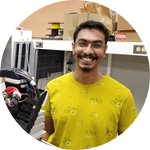About This Project
Photobioreactors are cultivation systems designed for growing photoautotrophic organisms using artificial light sources to facilitate photosynthesis. They are critical for biotech, but high costs of proprietary systems limit accessibility and open-source bioreactors are too limited. A customizable design is needed, allowing scientists to develop bespoke systems for use in many applications, including in lab settings and for appropriate technology distributed manufacturing applications.
Ask the Scientists
Join The DiscussionWhat is the context of this research?
We need photobioreactors in our own work to do alternative food research as well as low-cost drug discovery for low resource settings. The proprietary ones are absurdly expensive (e.g. $250,000) and the open source ones are meant for single specialized weird experiments. We need something that can be made large and can do lots of different things just like the $250,000 version.
This project will design and open source photobioreactor where each control sub-system (heating, oxygen and pH control) will be independently controlled but also be able to be coupled all together.
We will use this new photobioreactor to recycle 3-D printing waste into food with microalgae, but the application space a low-cost easy-to-maintain photobioreactor provides for the research community is much broader.
What is the significance of this project?
This could open up photobioreactors for everyone. Photobioreactors are used for a wide range of applications: medical applications, cultivation of bacteria, algae, and other similar species for use in laboratories or as food. A modular, adaptable photobioreactor will improve innovation in this space and make these research projects accessible. Parametric 3-D printed components will be designed to be easily modified to adapt to specific parts (e.g. to adapt to different types of sensors, pumps, motors or containers). This is a major benefit to the design over all commercial types. Thus, it will also be easier to recreate and maintain because the necessary components are readily available and the mechanical, electrical and software components are all customizable.
What are the goals of the project?
Research to be done with new photobioreactor: In distributed recycling and additive manufacturing it is know you can recycle a polymer 5x before high degradation of mechanical strength. In addition, microalgae, can degrade plastic materials with enzymes synthesized by microalgae itself while using the plastic polymers as carbon sources. There are several forms of microalgae that can be eaten by humans.
Our goal is to make a research-grade photobioreactor that can be fabricated for <$1000 in components -- 90% savings vs commercial systems. It can be used for many applications.
We will validate our open source photobioreactor by testing its ability
to create edible food using 3D printing waste. We will upcycle 3D waste from
our system using known edible microalgae.
Budget
This project will fund top 10% ranked students to design, build, and test a parametric open source photobioreactor. Funds will need to be delivered to the university understanding and the overhead that is allowed must be stated clearly in the paperwork.
Generally, I budget $45,000/graduate student/year. The $2500 for student time will only cover a small fraction of the time for the students to work on this project and it will be subsidized from other funds I have available in the research group.
The $2500 on materials and supplies will involve: containers, temperature sensors, pH sensors, dissolved oxygen sensors, optical sensors, controls including microcontrollers, displays, electronic components, heating elements, 3-D printer filament to make custom components, and LED lights and their controls.
Endorsed by
 Project Timeline
Project Timeline
Our goal is to have a tested and validated 10L version of an open source photobioreactor done by the end of the 2023. The project will start with us adapting Arduino-based control systems we have developed for other projects to a photobioreactor core design. We will develop a bill of materials, including purchasing alternative components so we can test several design approaches simultaneously. This will also help provide some insurance against supply chain disruptions. We will validate it.
Jun 01, 2023
Further adapt an OS electronics module for plug and play bioreactor
Jun 07, 2023
Project Launched
Jul 01, 2023
Acquire BOM to build new 10L OS photobioreactor
Aug 02, 2023
Project Launched
Aug 31, 2023
Validate and test photobioreactor using microalgae on waste plastic from 3-D printers
Meet the Team
Joshua Pearce
Joshua M. Pearce is the John M. Thompson Chair in Information Technology and Innovation at the Thompson Centre for Engineering Leadership & Innovation. He holds appointments at Ivey Business School, the top ranked business school in Canada and the Department of Electrical & Computer Engineering at Western University in Canada, a top 1% global university. He runs the Free Appropriate Sustainability Technology research group. His research concentrates on the use of open source appropriate technology (OSAT) to find collaborative solutions to problems in sustainability and to reduce poverty. His research spans areas of engineering of solar photovoltaic technology, open hardware, and distributed recycling and additive manufacturing (DRAM) using RepRap 3-D printing, but also includes policy and economics. His research is regularly covered by the international and national press. According to Elsevier’s citation metrics last year he was in the top 0.06% most cited scientists globally and is continually ranked in the top 0.1% for his accessible research on Academia.edu. He is the editor-in-chief of HardwareX, the first journal dedicated to open source scientific hardware and the author of the Open-Source Lab:How to Build Your Own Hardware and Reduce Research Costs, Create, Share, and Save Money Using Open-Source Projects, and To Catch the Sun, an open source book of inspiring stories of communities coming togetherto harness their own solar energy, and how you can do it too!
Additional Information
We want to develop an open source photobioreactor. We're focusing on designs that are cheap and large. We will test different scenarios where our goal is to figure out how big we can make it, and our plan to test this is by having redundant options that can overcome supply chain disruptions. The funding will help cover
materials costs for various prototypes and student.
I can also add a short story to our series on Aditi and Slick (for high school students). We will also do all the normal university social media outreach (Twitter, LinkedIn, Reddit). We will apply for an OSHWA certification, as well as post our preprint on Academia.edu and ResearchGate.
Funding allows only for build, validate and proof of concept. Funding beyond the project minimum will be used to expand experimentation in this space, investigate different organisms, recipes, waste streams, etc.
Project Backers
- 1Backers
- 100%Funded
- $5,005Total Donations
- $2,502.50Average Donation

